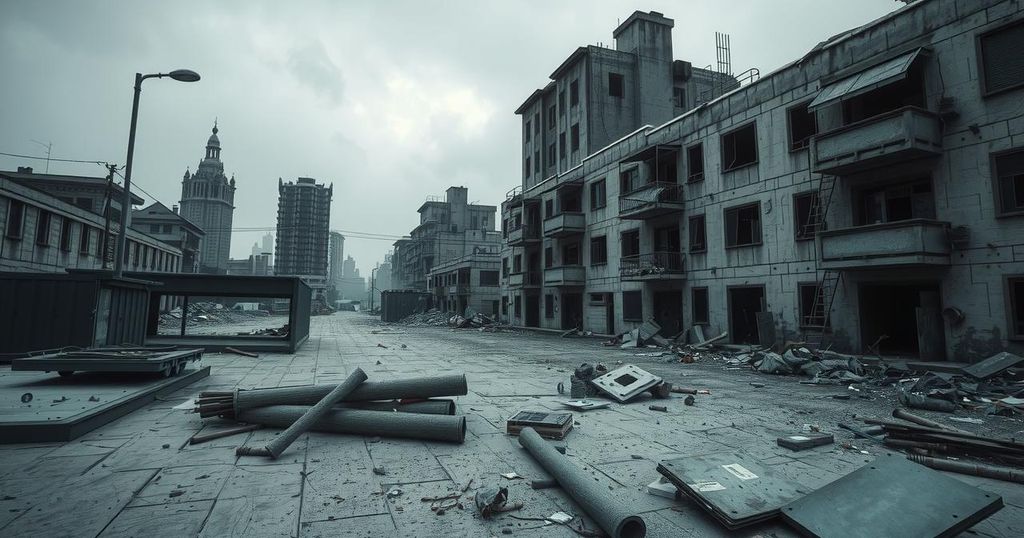Escalating Conflict in the DRC: The Rise of the M23 Rebel Group

The Democratic Republic of Congo faces escalating conflict driven by the M23 rebel group, which is expanding its territorial control, raising alarms of a major regional war. Clashes with Rwandan-backed forces have caused significant displacement and humanitarian crises. The DRC’s mineral wealth complicates the situation as international reactions remain limited, opening doors for external influences while local stability deteriorates.
The Democratic Republic of Congo (DRC) is currently facing a resurgence of conflict led by the M23 rebel group, which recently expanded its control by advancing southward from Goma. This alarming increase in violence, which has persisted for over a decade, poses a significant threat to peace in a region already plagued by unrest. Following M23’s seizure of Goma, the leader, Corneille Nangaa, expressed ambitions to reach Kinshasa, prompting a call for mobilization from President Félix Tshisekedi, who declared the need to reclaim the nation’s territory.
The DRC, which is about 4,000 miles from the United States, has endured brutality since its independence in 1960, yet international reactions have been muted. The conflict intensified over the past three years, particularly in January when clashes with Rwandan-supported M23 insurgents escalated. The United Nations reported that in just one month, over 400,000 individuals were displaced, as firefights in Goma resulted in casualties, including several peacekeepers.
With M23’s territorial gains, they are seeking to reclaim regions not under their control since the end of two significant wars that resulted in millions of civilian deaths. The DRC government has condemned the current offensive, labeling it as Rwanda’s declaration of war. Reports indicate that conditions in Goma have severely deteriorated, with bodies in the streets and essential services cut off, affecting food availability for the residents.
The ongoing violence has forced Romanian mercenaries who supported the Congolese government to find refuge at a United Nations base. Diplomatic responses include the meeting of the French Foreign Minister with President Tshisekedi amid protests against perceived inaction from the international community. President Donald Trump referred to the crisis as a serious issue, while Western nations’ slow response might grant geopolitical advantages to rivals like China and Russia.
M23, primarily composed of ethnic Tutsi, emerged in 2012 as a result of longstanding ethnic tensions exacerbated by Rwanda’s historical conflicts. After the Rwandan genocide of 1994, many Tutsi fled to eastern DRC, further complicating the region’s dynamics. Despite peace agreements attempting to stabilize the situation, challenges remain, as M23 claims that the Congolese government inadequately protects Tutsi individuals, while Rwanda denies supplying M23 with arms.
Although the DRC is politically unstable, it possesses vast mineral wealth, crucial for the electronics and renewable energy sectors, with most cobalt production being owned by Chinese firms. Amidst the violence, the effectiveness of the Congolese army’s protection over resources remains compromised. China has condemned the resurgence of M23, while experts express that an immediate threat to mineral supply chains appears to be low for now.
Rwanda’s previous engagement with M23 in 2012 ended abruptly due to international backlash, but this time, their actions have not faced the same scrutiny. Rwanda has positioned itself as a trusted partner to Western nations; however, ongoing support for Rwanda continues despite the conflict. Recent diplomatic moves from Germany and the UK, including potential reviews of support to Rwanda, highlight a response to the escalating violence in the DRC, yet M23’s momentum remains unchallenged.
The DRC has a troubled history of conflict dating back to its independence from Belgium in 1960, with multiple rebel groups vying for power, particularly in the resource-rich eastern regions. The latest wave of violence, particularly driven by the M23 rebel group, has escalated sharply, displacing hundreds of thousands of people and drawing international concern amid fears of wider regional instability. The DRC’s immense mineral wealth, particularly cobalt, further complicates the conflict, as various factions seek control over lucrative resources, influencing global supply chains.
The resurgence of violence led by M23 in the DRC underscores the fragility of the region’s stability, with dire humanitarian consequences already evident. International responses remain tepid, raising concerns over the implications of Rwanda’s involvement and the potential for increased geopolitical influence from nations such as China and Russia. As conflict persists, the complexity of ethnic tensions and the stakes involved in mineral wealth will continue to shape the DRC’s tumultuous political landscape.
Original Source: www.nbcnews.com






